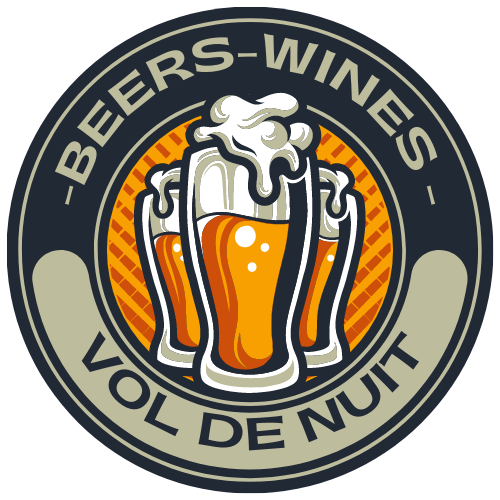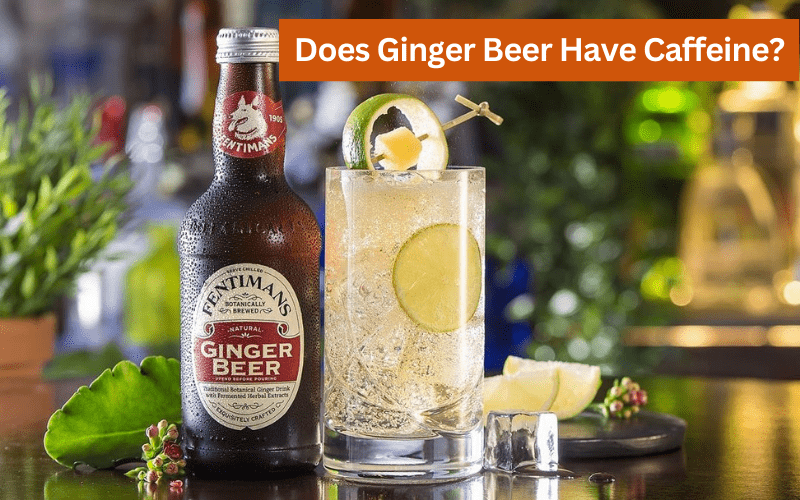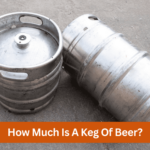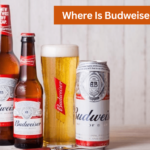If you are a ginger beer lover and also happen to be caffeine-sensitive, the question of does ginger beer have caffeine might have crossed your mind at some point. I am the one who enjoys a cold glass of ginger beer on a warm day, so I have wondered about the caffeine content of this beloved drink. Ginger beer has been gaining popularity as a refreshing and flavorful alternative to sodas and energy drinks. However, with the increasing interest in caffeine-free beverages, it’s crucial to know whether ginger beer contains caffeine or not. In this article, we’ll go into the question, does ginger beer have caffeine?, and find out everything there is to know about the topic.
What is Ginger Beer?
Ginger beer is a type of carbonated drink that is typically made from ginger root, sugar, and water. It has a slightly spicy and sweet flavor, and is often enjoyed as a refreshing beverage on its own or mixed into cocktails. Ginger beer has a long history, with its origins dating back to the 18th century. Today, it is a popular beverage around the world, and is available in many different brands and variations.
The Ingredients of Ginger Beer
The ingredients used to make ginger beer can vary depending on the recipe and the brand, but the basic ingredients typically include:
- Ginger Root: This is the main ingredient in ginger beer, providing the signature spicy and slightly sweet flavor. Fresh ginger root is typically used, although some brands may use ginger extract or flavoring.
- Sugar: Sugar is added to the ginger beer mixture to provide sweetness and to help with the fermentation process.
- Water: Water is the base of ginger beer, and is used to create the carbonation and to dilute the other ingredients.
- Yeast: Yeast is added to the ginger beer mixture to help with the fermentation process. This is what creates the carbonation and alcohol (if the ginger beer is alcoholic).
- Lemon or Lime Juice: Some recipes may call for the addition of lemon or lime juice to add acidity and balance the sweetness.
- Spices: Depending on the recipe, other spices such as cinnamon, cloves, and allspice may be added to the ginger beer mixture to enhance the flavor.
- Other Flavorings: Some ginger beer brands may add other flavorings such as fruit juices or extracts to create unique flavors and variations.
Overall, the ingredients used in ginger beer are relatively simple and can be adjusted to suit personal preferences. However, the use of fresh ginger root and the fermentation process are key factors in creating the distinct flavor and carbonation of traditional ginger beer.
Types of Ginger Beer
There are different types of ginger beer, and they can be classified based on various factors such as alcohol content, sweetness level, and production method. Here are some of the most common types of ginger beer:
- Traditional Ginger Beer: This is the original ginger beer, which is brewed using fresh ginger root, sugar, and water, and is then fermented with yeast to create a natural carbonation. Traditional ginger beer has a spicy and slightly sweet flavor, and can be either alcoholic or non-alcoholic.
- Alcoholic Ginger Beer: This type of ginger beer has a higher alcohol content, typically ranging from 4-8%, and is made through a longer fermentation process. Alcoholic ginger beer can have a more complex flavor profile and is often enjoyed as a mixer in cocktails.
- Non-Alcoholic Ginger Beer: This type of ginger beer is often preferred by those who do not consume alcohol or are looking for a non-alcoholic alternative. Non-alcoholic ginger beer typically has a lower sugar content than traditional ginger beer and can be sweetened with artificial sweeteners or natural sweeteners such as stevia.
- Sweetened Ginger Beer: This type of ginger beer is sweeter than traditional ginger beer and may contain additional sweeteners such as honey, agave nectar, or cane sugar.
- Spiced Ginger Beer: Some ginger beer brands may add other spices such as cinnamon, cloves, and allspice to create unique flavor profiles.
- Flavored Ginger Beer: Some ginger beer brands may add other flavors such as fruit juices or extracts to create unique flavors and variations.
The type of ginger beer one chooses can depend on personal preferences and intended use, such as whether it will be consumed on its own or used as a mixer in cocktails.
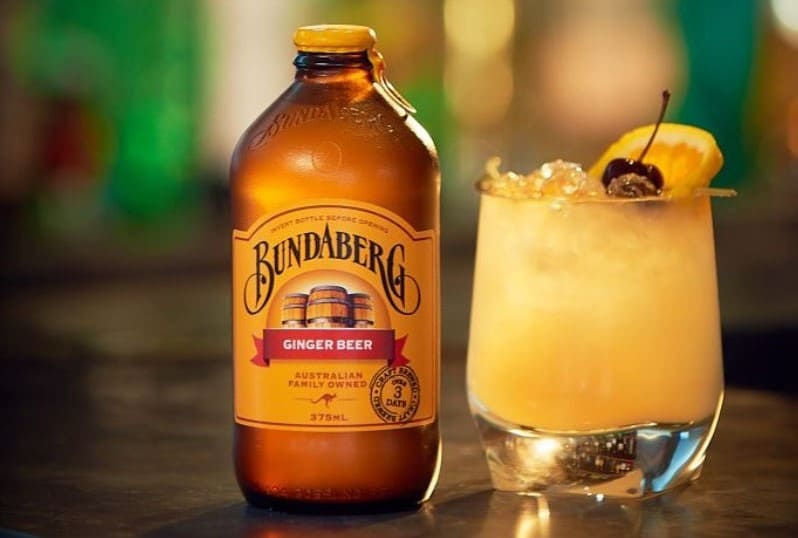
The Brewing Process of Ginger Beer
The brewing process of ginger beer can vary depending on the recipe and the desired outcome, but there are the basic steps involved in making traditional ginger beer:
- Prepare the Ginger: Start by peeling and grating fresh ginger root. The amount of ginger used can vary depending on the recipe and desired flavor intensity.
- Create the Ginger Syrup: In a saucepan, combine the grated ginger, sugar, and water. Bring to a boil and then reduce the heat, allowing the mixture to simmer for about 30 minutes until it forms a syrup.
- Cool the Ginger Syrup: Once the ginger syrup has cooled, strain it through a fine mesh strainer to remove any ginger pieces.
- Add Yeast: Sprinkle yeast into the cooled ginger syrup, stirring gently to combine.
- Fermentation: Transfer the mixture to a glass bottle or jar, leaving some space at the top. Cover the container with a cheesecloth or a loose-fitting lid and let it sit at room temperature for several days, allowing the yeast to ferment and create carbonation.
- Bottle the Ginger Beer: Once the ginger beer has reached the desired level of carbonation, it can be bottled and stored in the fridge to chill. The ginger beer can continue to ferment in the bottle, so it’s important to periodically release some of the carbonation by opening the bottle lid.
So, the brewing process of ginger beer requires some patience and attention to detail, but it can be a rewarding process for those who enjoy making their own beverages at home.
Caffeine: What Is it and How Does it Affect the Body?
Caffeine is a natural stimulant that is found in many different foods and beverages, including coffee, tea, chocolate, and soda. Here are some of the ways caffeine can affect the body:
- Boosts Energy and Alertness: Caffeine stimulates the central nervous system, which can increase energy levels and improve mental alertness.
- Improves Physical Performance: Caffeine can help improve physical performance by reducing perceived exertion, increasing endurance, and enhancing muscle contraction.
- Enhances Mood: Caffeine can improve mood and decrease feelings of depression by increasing the levels of certain neurotransmitters in the brain.
- Increases Heart Rate and Blood Pressure: Caffeine can cause a temporary increase in heart rate and blood pressure, which can be a concern for those with certain medical conditions.
- Disrupts Sleep: Caffeine can disrupt sleep by decreasing the amount of time it takes to fall asleep, reducing the quality of sleep, and causing wakefulness during the night.
- Causes Withdrawal Symptoms: Regular consumption of caffeine can lead to dependence, and abrupt cessation or reduction of caffeine intake can cause withdrawal symptoms such as headaches, fatigue, and irritability.
- Affects Digestion: Caffeine can increase the production of stomach acid, which can lead to indigestion, heartburn, and other digestive issues.
Frankly speaking, caffeine can have both positive and negative effects on the body depending on the amount consumed and individual sensitivity. It is recommended to consume caffeine in moderation and be aware of any adverse effects on the body.

The Symptoms of Caffeine Sensitivity
Individuals who are sensitive to caffeine may experience a range of symptoms after consuming beverages that contain caffeine, including:
- Jitters or shakiness
- Anxiety or nervousness
- Rapid heart rate or palpitations
- Difficulty sleeping or insomnia
- Headaches or migraines
- Gastrointestinal upset or nausea
- Muscle tremors or twitching
- Sweating or flushing
- Difficulty concentrating or feeling scattered
- Increased blood pressure
The severity of symptoms can vary depending on the individual’s sensitivity level, as well as the amount of caffeine consumed. It’s important to note that caffeine sensitivity can develop at any time, even in individuals who have previously had no issues with consuming caffeine.
If you experience any of these symptoms after consuming caffeine, it may be a sign that you are sensitive to caffeine and should consider reducing your intake or avoiding caffeine altogether.
Does Ginger Beer Have Caffeine?
Is there caffeine in ginger beer is a common question among consumers. The answer is that it depends on the brand and type of ginger beer. While some ginger beer brands do contain caffeine, such as those that are sweetened with guarana or use tea leaves in their brewing process, most ginger beers are caffeine-free.
You should check the label or ingredients list of a particular brand to determine whether or not it contains caffeine. For those who are sensitive to caffeine or looking for a caffeine-free option, there are many ginger beer brands that are caffeine-free and offer a refreshing and flavorful alternative.
Does Ginger Beer Have Caffeine in Different Brands
When it comes to “Does ginger beer have caffeine?”, it is crucial to note that it can vary depending on the brand and type. Here is a breakdown of whether some popular ginger beer brands contain caffeine:
Does Bundaberg Ginger Beer have caffeine?
Bundaberg is a popular ginger beer brand that is known for its rich and robust flavor. However, the good news for those who are sensitive to caffeine is that Bundaberg ginger beer is caffeine-free. According to the Bundaberg website, their ginger beer contains only natural flavors, and no caffeine or other stimulants are added.
Does Gosling’s Ginger Beer have caffeine?
Gosling’s ginger beer is a popular brand that is often used as a mixer in cocktails, especially in the famous Dark ‘N’ Stormy cocktail. While the original Gosling’s ginger beer contains no caffeine, the brand also offers a “Stormy Ginger Beer” that does contain caffeine. The Stormy Ginger Beer is sweetened with natural ginger and molasses flavors and has a higher caffeine content due to the addition of guarana.
Does Old Jamaica Ginger Beer have caffeine in it?
Old Jamaica ginger beer is a Caribbean-style ginger beer that is known for its bold and spicy flavor. According to the Old Jamaica website, their ginger beer is caffeine-free and is made using only natural ginger extract and other natural flavors.
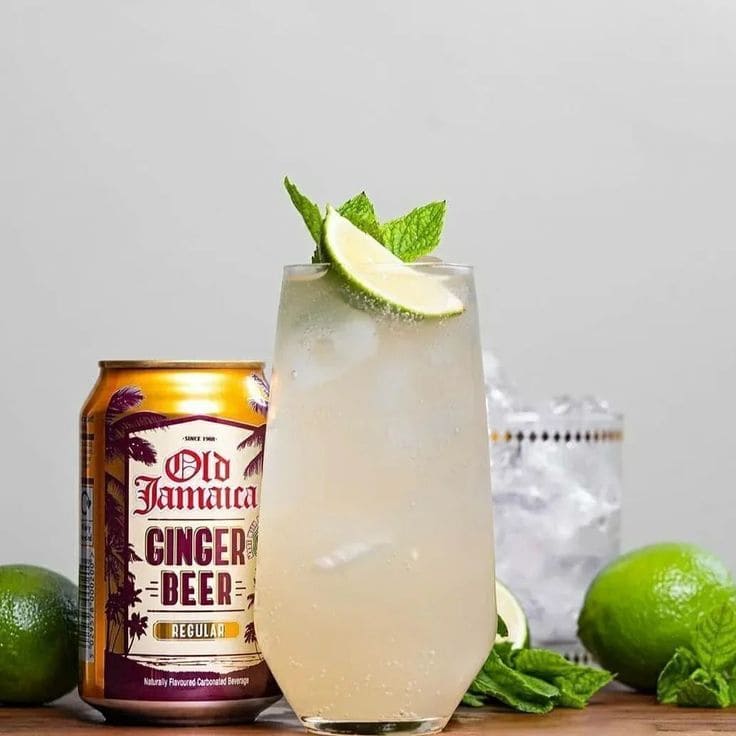
Does Stoney Ginger Beer have caffeine?
toney ginger beer is a popular brand that is widely available in Africa and the United Kingdom. The good news for those who are looking for a caffeine-free option is that Stoney ginger beer is caffeine-free. According to the Stoney website, their ginger beer is made using natural ginger flavors and does not contain any caffeine or other stimulants.
Does Reed’s Ginger Beer have caffeine?
Reed’s ginger beer is a popular brand that is known for its use of natural and organic ingredients. Reed’s offers several different varieties of ginger beer, including a caffeine-free version. However, some of their other ginger beer products, such as the “Spiced Apple Brew,” do contain caffeine due to the addition of black tea extract.
Does Q Ginger Beer have caffeine?
Q ginger beer is a premium ginger beer brand that is known for its high-quality ingredients and unique flavor profile. The good news for those who are looking for a caffeine-free option is that Q ginger beer is caffeine-free. According to the Q Drinks website, their ginger beer is made using natural ginger and other natural flavors and does not contain any caffeine or other stimulants.
Why Does Ginger Beer Not Always Contain Caffeine?
There are a few reasons why ginger beer may not always contain caffeine:
- Traditional Recipe: Traditional ginger beer recipes do not call for the addition of caffeine-containing ingredients such as guarana or tea leaves. Instead, ginger beer is typically brewed using fresh ginger root, sugar, and water, and is then fermented with yeast to create a natural carbonation. This natural brewing process does not involve the addition of caffeine-containing ingredients.
- Consumer Preferences: Many consumers enjoy ginger beer as a non-alcoholic, caffeine-free alternative to other beverages such as soda or energy drinks. For this reason, many ginger beer brands choose to produce caffeine-free products to appeal to a wider range of consumers.
- Health Concerns: Caffeine can have both positive and negative effects on the body, and some individuals may be sensitive to its effects. For this reason, ginger beer brands may choose to produce caffeine-free products to cater to those who are looking to avoid caffeine for health reasons.
- Brand Identity: Some ginger beer brands may choose to differentiate themselves from other beverages by producing caffeine-free products. This can be part of their brand identity and marketing strategy, and can appeal to consumers who are looking for a unique and flavorful beverage that is also caffeine-free.
How Much Caffeine in Ginger Beer Normally?
Ginger beer normally does not contain caffeine, or contains only small amounts due to the addition of certain ingredients such as guarana or tea leaves. The caffeine content of ginger beer can vary depending on the brand and type, but it is generally low compared to other caffeinated beverages such as coffee or energy drinks.
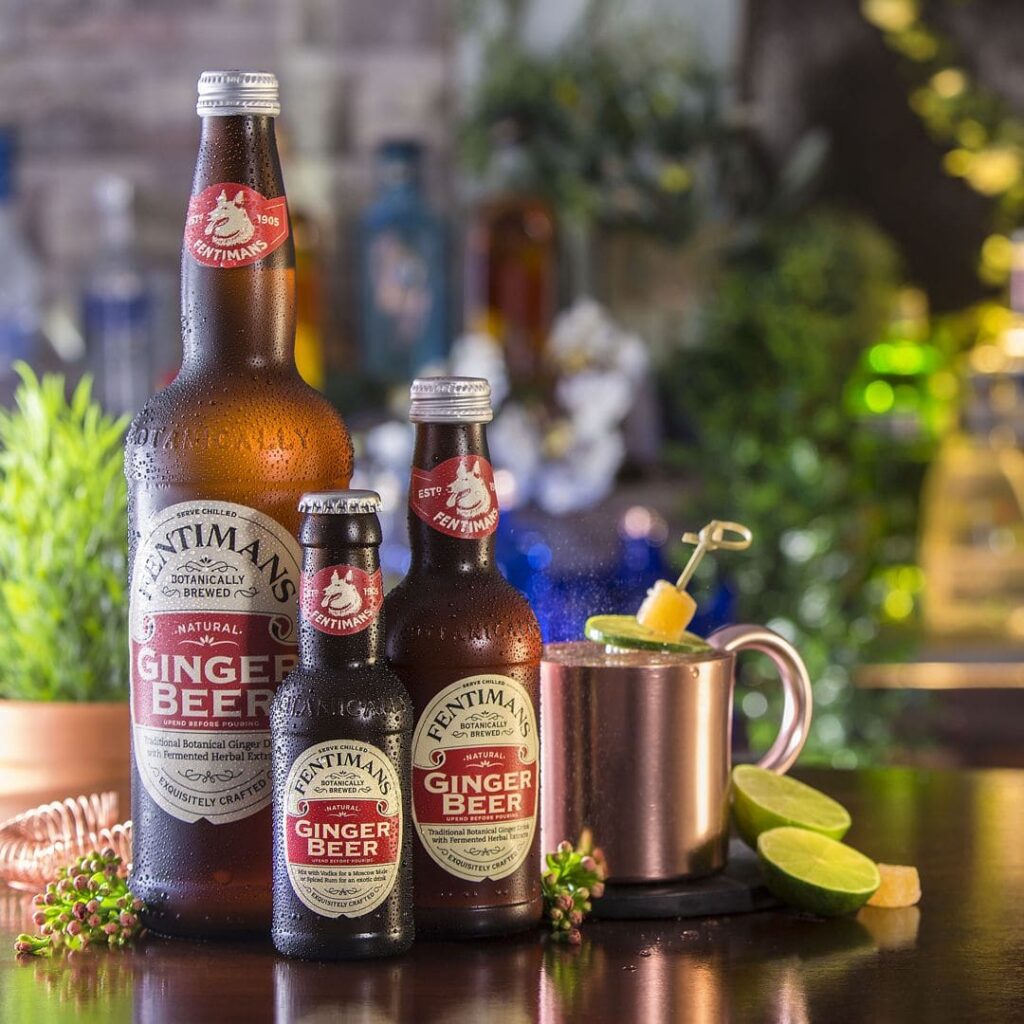
Factors that Affect Caffeine Content in Ginger Beer
There are a few factors that can affect the caffeine content in ginger beer:
- Recipe: The recipe used to make ginger beer can affect the caffeine content. Traditional ginger beer recipes do not typically contain caffeine, while recipes that call for the addition of guarana or tea leaves will have a higher caffeine content.
- Brewing Process: The brewing process used to make ginger beer can also affect the caffeine content. Ginger beer that is brewed using tea leaves or other caffeine-containing ingredients will have a higher caffeine content than ginger beer that is brewed using only ginger, sugar, and water.
- Serving Size: The caffeine content of ginger beer can also vary depending on the serving size. Larger serving sizes will naturally contain more caffeine than smaller serving sizes.
- Brand and Type: Different ginger beer brands and types can have varying levels of caffeine. It’s important to check the label or ingredients list of a particular brand to determine whether or not it contains caffeine.
Therefore, while ginger beer is typically a low-caffeine beverage, the caffeine content can vary depending on the recipe, brewing process, serving size, brand, and type.
Differences Between Beer and Ginger Beer
| Beer | Ginger Beer |
| Alcoholic beverage made from fermented grains, hops, and yeast | Non-alcoholic beverage made from ginger root, sugar, and water |
| Typically has a bitter taste and is served cold | Typically has a spicy and sweet taste and is served both cold and hot |
| Contains varying amounts of alcohol, usually around 4-6% ABV | Contains no alcohol, or very low levels of alcohol (less than 0.5% ABV) |
| Carbonated naturally or artificially | Carbonated naturally through the fermentation process |
| Can be brewed in a variety of styles, such as lagers, ales, and stouts | Generally only one style, although variations can be made with additional flavors such as lime or pineapple |
| Contains hops, which contribute to its bitterness and flavor | Contains ginger, which contributes to its spiciness and flavor |
| Is often consumed in larger quantities and can have a higher calorie count | Is often consumed in smaller quantities and typically has a lower calorie count |
| Can be paired with a variety of foods, such as burgers, pizza, and spicy dishes | Can be paired with a variety of foods, such as Asian cuisine and desserts |
| Can have a range of health benefits and drawbacks, depending on factors such as alcohol content and ingredients used | Can have a range of health benefits and drawbacks, depending on factors such as sugar content and ingredients used |
Ginger Beer Vs. Ginger Ale
| Ginger Beer | Ginger Ale | |
| Flavors | Spicy and sweet | Mild and sweet |
| Carbonation | Naturally carbonated | Artificially carbonated |
| Ingredients | Ginger root, sugar, and water | Ginger extract, high fructose corn syrup, and water |
| Alcohol Content | Typically non-alcoholic or very low (less than 0.5% ABV) | Always non-alcoholic |
| Health Benefits | May contain probiotics and anti-inflammatory compounds from ginger | Typically no significant health benefits |
| Popular Brands | Bundaberg, Gosling’s, Reed’s | Canada Dry, Schweppes, Seagram’s |
While ginger beer and ginger ale share a common flavor profile, they differ in terms of their ingredients, carbonation, and health benefits.
Ginger beer is typically made with natural ingredients and is naturally carbonated through the fermentation process, while ginger ale is made with artificial ingredients and is artificially carbonated. Additionally, ginger beer may contain health benefits from the ginger root, while ginger ale is typically just a sweet and refreshing soda.
Is ginger beer stronger than ginger ale?
In terms of flavor, ginger beer is generally considered to be stronger than ginger ale. Ginger beer has a spicier and more robust flavor, with a stronger ginger taste compared to the milder taste of ginger ale.
However, when it comes to alcohol content, ginger ale and ginger beer can differ. Ginger ale is always a non-alcoholic beverage, while ginger beer can contain alcohol, although it is typically very low (less than 0.5% ABV) or non-alcoholic. Some ginger beer brands may contain higher alcohol levels, but these are less common and often labeled as “alcoholic ginger beer.”
So, ginger beer is stronger in terms of flavor compared to ginger ale, but may or may not be stronger in terms of alcohol content depending on the brand and type.
Does ginger ale have caffeine?
Many people wonder is there caffeine in ginger ale. The answer is that there is no caffeine in ginger ale. Most ginger ale products do not contain caffeine, although certain brands may contain trace quantities of caffeine owing to the use of additives like kola nut extract or natural flavors.
Is Ginger Beer Actually Beer?
While the name may suggest that ginger beer is a type of beer, it is not actually a true beer in the traditional sense. Ginger beer is a non-alcoholic beverage that is brewed using ginger root, sugar, and water. While it is brewed using a similar process to beer, it is typically not fermented for as long and does not contain the same ingredients as traditional beer.
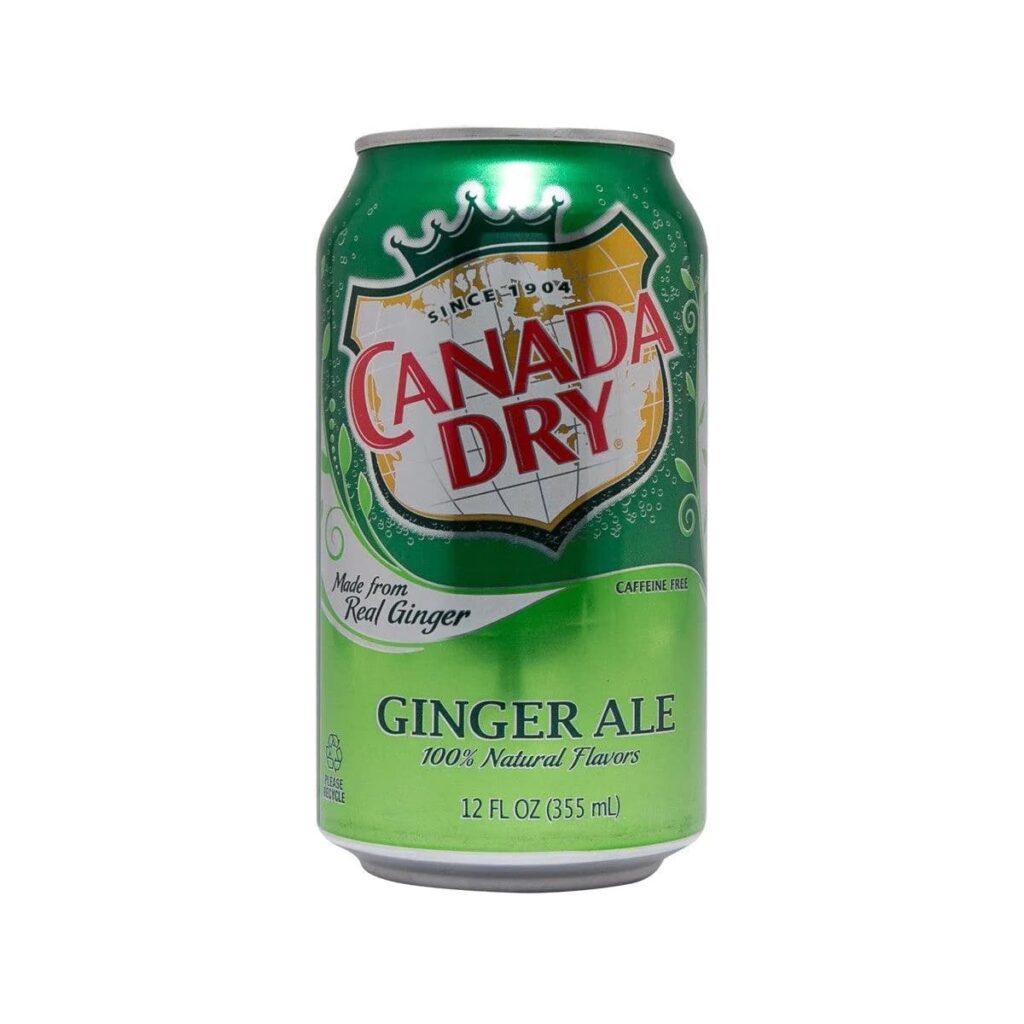
Does Ginger Beer Contain Any Alcohol in it?
While some ginger beer brands may contain small amounts of alcohol due to the fermentation process, most ginger beer products do not contain any significant alcohol content.
In the United States, for example, ginger beer is considered a non-alcoholic beverage if it contains less than 0.5% ABV. Some brands may produce an alcoholic ginger beer with a higher alcohol content, but these are less common and often labeled as such. For those who are looking for a non-alcoholic option, most ginger beer brands offer a refreshing and flavorful alternative to traditional beer.
How Many Calories does Ginger Beer Have?
Based on nutrition information, a serving size of one can (355.000g) of ginger beer contains approximately 199 calories. However, the calorie content can vary depending on the brand and type of ginger beer, as well as any additional ingredients that may be used. Some brands may offer low-calorie or diet options for those who are looking to reduce their calorie intake while still enjoying the refreshing taste of ginger beer.
Is Ginger Beer Good for You?
While ginger beer can offer some potential health benefits from the ginger root, it is still a sugary beverage and should be consumed in moderation. Ginger beer can be a refreshing and flavorful alternative to other sodas or alcoholic beverages, but be mindful of the sugar and calorie content. As with any food or beverage, it is always best to consult with a healthcare provider to determine if ginger beer is a suitable addition to your diet.
Health benefits of ginger beer
Ginger beer may offer some potential health benefits, thanks to its main ingredient, ginger root. Here are some of the potential health benefits of ginger beer:
- Anti-inflammatory properties: Ginger contains compounds that have anti-inflammatory effects on the body. Consuming ginger beer may help reduce inflammation in the body, which can help with conditions such as arthritis, heart disease, and cancer.
- Digestive aid: Ginger has long been used as a digestive aid and can help alleviate nausea and vomiting. Ginger beer may help soothe an upset stomach and aid in digestion.
- Immune system booster: Ginger contains antioxidants and compounds that can help boost the immune system, making it a helpful addition during cold and flu season.
- May improve heart health: The anti-inflammatory properties of ginger may also help improve heart health by reducing the risk of heart disease and lowering cholesterol levels.
- May aid in weight loss: While ginger beer is a sugary beverage, ginger itself has been shown to have a positive impact on weight loss. Ginger can help increase metabolism and reduce appetite, making it a potentially helpful tool for those looking to lose weight.
Is ginger beer good for your stomach?
Ginger has long been used as a natural remedy for digestive issues and ginger beer may be helpful for soothing an upset stomach. Ginger contains compounds that have anti-inflammatory effects on the body, which can help reduce inflammation in the gut and ease digestive discomfort.
Is ginger beer good for high blood pressure?
While ginger beer has not been specifically studied for its effects on high blood pressure, ginger in general may have some potential benefits for heart health. Ginger contains compounds that have anti-inflammatory and antioxidant effects on the body, which can help improve circulation and reduce the risk of heart disease.
However, it’s always best to consult with a healthcare provider before adding ginger beer to your diet if you have high blood pressure.
Is ginger beer good for acid reflux?
Ginger has been shown to have some potential benefits for reducing symptoms of acid reflux. Ginger can help reduce inflammation in the gut and increase digestion, which can help reduce the occurrence of acid reflux.
However, you should note that ginger beer is a sugary beverage, which can exacerbate acid reflux symptoms for some individuals. As with any food or beverage, it’s best to consult with a healthcare provider to determine if ginger beer is a suitable addition to your diet if you have acid reflux
Can ginger beer keep you awake?
Ginger beer typically does not contain enough caffeine to keep you awake. While some ginger beer brands may contain small amounts of caffeine due to the addition of certain ingredients such as kola nut extract or natural flavors, the caffeine content is typically very low.
Additionally, ginger itself is not known to have stimulating effects on the body that would interfere with sleep. However, it’s important to note that ginger beer is a sugary beverage and consuming large amounts before bed could lead to discomfort or indigestion, which could make it harder to fall asleep.
Alternatives to Ginger Beer with Caffeine
For those looking for caffeine-free alternatives to ginger beer, there are many different types of beverages to choose from, including:
The different types of caffeine-free drinks
Here are some examples of different types of caffeine-free drinks:
- Herbal teas: Herbal teas are naturally caffeine-free and come in a wide variety of flavors. Some popular herbal teas include chamomile, peppermint, and ginger.
- Fruit juices: Many fruit juices are naturally caffeine-free and can be a great way to hydrate while also getting vitamins and nutrients.
- Flavored water: Flavored water, such as sparkling water or still water with added fruit flavoring, can be a refreshing and hydrating alternative to caffeinated drinks.
- Milk-based drinks: Milk-based drinks, such as hot chocolate or chai lattes, can be made without caffeine and offer a creamy and comforting option.
- Smoothies: Smoothies made with fresh fruit, vegetables, and milk or yogurt can be a healthy and satisfying way to stay hydrated and energized without caffeine.
- Decaffeinated coffee or tea: For those who still enjoy the taste of coffee or tea, decaffeinated versions can be a great option that still offers the familiar flavor without the caffeine content.
There are many other types of caffeine-free drinks available, so it’s always a good idea to explore different options and find what works best for your individual taste and preferences.
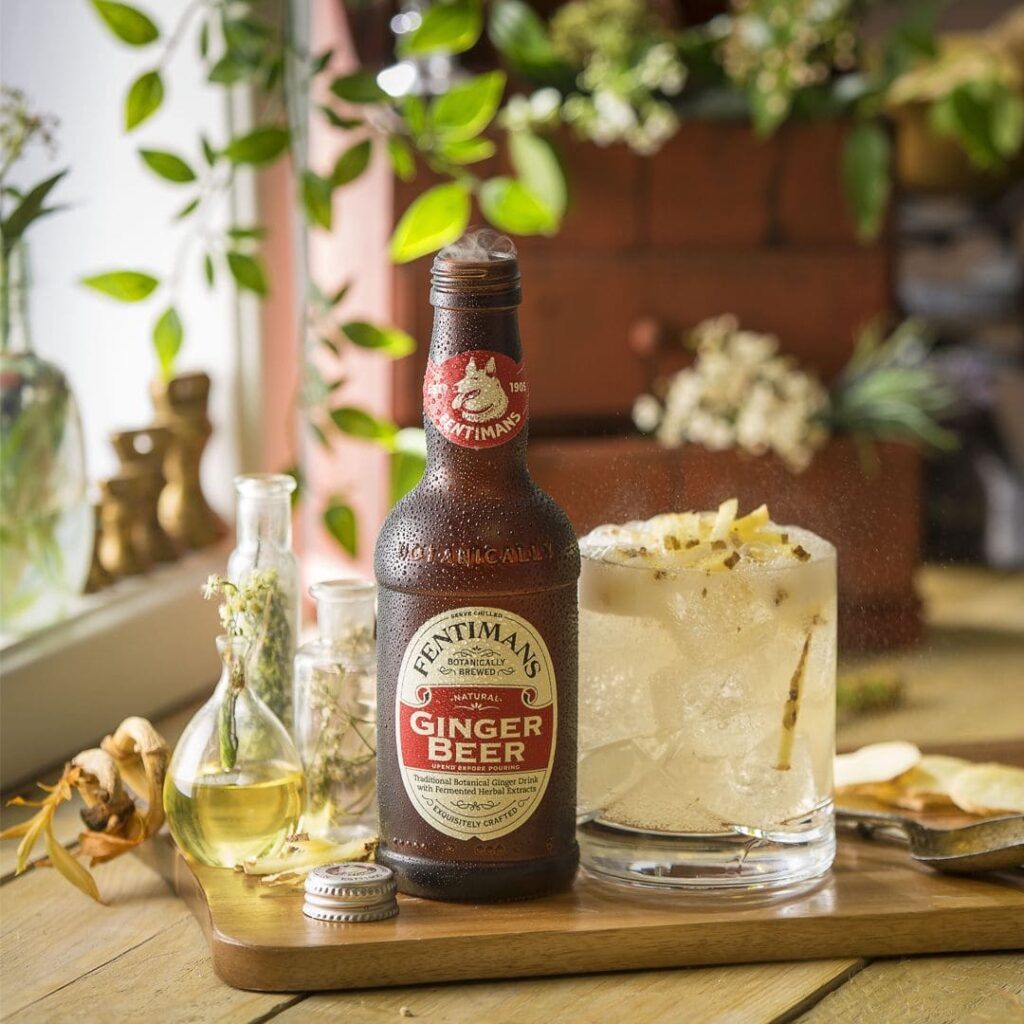
The benefits of drinking caffeine-free drinks
There are many potential benefits to consuming caffeine-free drinks, including:
- Improved sleep: Caffeine can interfere with sleep patterns and make it harder to fall asleep or stay asleep. Choosing caffeine-free drinks can help improve the quality and duration of sleep.
- Reduced anxiety: Caffeine can cause jitters or anxiety in some individuals. Opting for caffeine-free drinks can help reduce these symptoms and promote feelings of calmness and relaxation.
- Better hydration: Many caffeine-free drinks, such as water or herbal tea, can be great sources of hydration without the diuretic effects of caffeine.
- Improved digestion: Certain caffeine-free drinks, such as herbal teas, can help soothe an upset stomach and aid in digestion.
- Reduced risk of dehydration: Caffeine can cause dehydration in some individuals, particularly when consumed in excess. Choosing caffeine-free drinks can help reduce the risk of dehydration and promote overall hydration.
- Lower calorie intake: Many caffeinated drinks, such as sodas or energy drinks, can be high in calories and sugar. Choosing caffeine-free drinks can be a healthier alternative and help reduce overall calorie intake.
The best brands of caffeine-free drinks
- Honest Tea: Honest Tea offers a wide range of organic, caffeine-free teas in a variety of flavors, including herbal teas and fruit teas.
- LaCroix: LaCroix offers a variety of sparkling water flavors that are naturally flavored and free from caffeine, calories, and sugar.
- Tropicana: Tropicana offers a wide range of 100% fruit juices that are naturally caffeine-free and come in a variety of flavors.
- Harmless Harvest: Harmless Harvest offers a variety of coconut water-based drinks that are free from caffeine and artificial ingredients.
- Numi Organic Tea: Numi Organic Tea offers a range of organic and fair trade teas, including caffeine-free herbal teas and fruit teas.
- Suja Juice: Suja Juice offers a variety of organic and cold-pressed juices that are free from caffeine and artificial ingredients.
Ginger Beer Recipe
Here’s a simple recipe for making ginger beer at home:
Ingredients
- 1 cup chopped ginger
- 1 cup sugar
- 6 cups water
- 1/4 cup fresh lemon juice
- 1/4 cup ginger bug (natural starter made from ginger and sugar)
Instructions
- In a large pot, combine chopped ginger, sugar, and water.
- Bring to a boil, then reduce heat and simmer for 30 minutes.
- Strain ginger and add fresh lemon juice.
- Allow mixture to cool, then add ginger bug.
- Transfer mixture to a bottle or jar and let it ferment for 2-3 days.
- Once fermented, store in the fridge and enjoy.
Notes
- You can adjust the amount of sugar and ginger based on your personal taste preferences.
- Ginger bug can be made by combining grated ginger, sugar, and water and allowing it to ferment for a few days. It will become bubbly and fizzy, which can be used as a natural starter for ginger beer.
Tips for making caffeine-free ginger beer
Here are some tips for making caffeine-free ginger beer:
- Use caffeine-free ingredients: Look for ingredients that are naturally caffeine-free, such as herbal teas or fruit juices.
- Avoid kola nut extract: Kola nut extract is a common ingredient in some ginger beer brands that can contain caffeine. When making ginger beer at home, it’s best to avoid using kola nut extract to ensure the drink is caffeine-free.
- Use a natural starter: Instead of using store-bought yeast, try using a natural starter made from ginger and sugar to ferment the ginger beer. This can help ensure that the drink is caffeine-free and also offers potential health benefits.
- Consider using decaf tea: If you’re looking for a way to add some depth and complexity to your ginger beer, consider using decaf tea as a base. This can provide a similar flavor profile as caffeinated tea without the added caffeine.
- Experiment with different flavorings: Ginger beer can be flavored with a wide range of ingredients, including fresh fruit juices, herbs, and spices. Experiment with different flavor combinations to find the perfect caffeine-free recipe for you.
- Monitor fermentation time: The longer you let the ginger beer ferment, the more carbonation and alcohol it will contain. If you’re looking for a caffeine-free ginger beer with minimal alcohol content, monitor the fermentation time carefully and store in the fridge once it reaches your desired carbonation level.
FAQs
Can ginger beer cause caffeine withdrawal?
No, ginger beer does not contain enough caffeine to cause caffeine withdrawal symptoms.
Does ginger beer give you energy?
Ginger beer does not contain caffeine, which is a common stimulant that can provide a boost of energy. However, ginger is known for its potential to boost metabolism and improve circulation, which can help improve energy levels.
Is ginger beer good for arthritis?
Ginger has anti-inflammatory properties that may help reduce inflammation and pain associated with arthritis. However, more research is needed to confirm the potential benefits of ginger beer specifically for arthritis.
Is ginger beer safe to drink during pregnancy?
It is generally safe for pregnant women to consume small amounts of ginger beer. However, it is always recommended to consult with a healthcare provider before consuming any new food or beverage during pregnancy.
Can you mix ginger beer and coffee?
While it is possible to mix ginger beer and coffee, the combination may not be appealing to everyone. Additionally, it is important to note that ginger beer does not contain caffeine, while coffee is a significant source of caffeine.
Can you drink ginger beer alone?
Yes, ginger beer can be enjoyed on its own as a refreshing and flavorful non-alcoholic beverage.
Can kids drink ginger beer?
Ginger beer is generally safe for kids to consume in moderation. However, it is important to note that some ginger beer brands may contain small amounts of alcohol, so it’s important to check the label and consult with a healthcare provider if there are any concerns.
Is ginger beer made from soda?
Ginger beer is similar to soda in that it is a carbonated beverage, but it is typically brewed using natural ingredients like ginger, sugar, and yeast.
Is ginger beer better for you than Coke?
Ginger beer may be a healthier alternative to Coke because it typically contains fewer calories and less sugar. However, it is important to note that some ginger beer brands may still contain added sugars or artificial sweeteners.
Does ginger beer help with weight loss?
While ginger has been associated with potential weight loss benefits, there is no clear evidence to suggest that ginger beer specifically can help with weight loss.
Can I drink ginger beer while on medication?
It is important to consult with a healthcare provider before consuming any new food or beverage while taking medication, as some ingredients may interact with certain medications.
Can ginger beer help with menstrual cramps?
Ginger has been traditionally used to help relieve menstrual cramps, and there is some scientific evidence to support its potential benefits. However, more research is needed to confirm the potential benefits of ginger beer specifically for menstrual cramps.
Conclusion
As shown above, we have explored the topic of does ginger beer have caffeine from various angles, examining the brewing process, ingredients, and different types of ginger beer. We have also discussed the effects of caffeine on the body, health benefits of ginger beer, and alternatives to ginger beer with caffeine. While some ginger beer brands may contain caffeine, there are also plenty of caffeine-free options available. Ultimately, whether or not ginger beer contains caffeine depends on the brand and brewing process. However, with the increasing interest in caffeine-free drinks, there are many great options for those looking to enjoy ginger beer without the added caffeine. So, go ahead and enjoy a cold glass of ginger beer knowing that you have options available to suit your caffeine preferences.
I’m Chen Mina, from Vol de Nuit, who has a special passion for bartending, especially mixing wine, beer, and cooktail. Here you will find content about alcoholic beverages, I will bring you knowledge that few people know about this drink.
